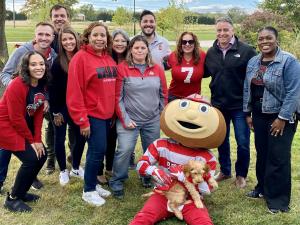Welcome to the Business and Finance Diversity, Equity and Inclusion (DEI) Training and Professional Development Guide! It has been developed to support our mission to foster a more diverse and inclusive climate and build a community that promotes an equitable, healthy, supportive, and nurturing environment in Business and Finance.
A Message from the B&F DEI Committee

The Office of Business and Finance is committed to creating a work environment in which all people feel welcome, supported, and valued. Education is essential to this goal, and this guide serves as a helpful tool to further our staff’s knowledge of diversity, equity and inclusion concepts and culture.
In this DEI Training and Professional Development Guide, you can access:
- On-Demand Resources
- Workshops, Events and Continuing Education opportunities
- Recommended Books, TV, Films, and Podcasts
- Tools designed especially for managers to support their team's DEI efforts
This array of carefully curated resources will help you deepen your understanding of diversity, equity and inclusion topics. To create a strong foundational base, we recommend beginning with the Getting Started - DEI Basics before moving on.
We hope you find these tools informative and helpful to your learning journey.
Getting Started - DEI Basics
Diversity, equity and inclusion is a complex topic comprised of deeply intertwined historical, social, psychological, and economic concepts. It can often feel challenging to know where to start, especially if you are new to the work. The following series of short, self-paced training and videos are designed to help you build a foundational understanding of DEI terms, concepts, and issues so you can get the most out of subsequent learning opportunities.
- Diversity Basics – BuckeyeLearn
- Glossary of Bias Terms – Washington University in St. Louis
- Social Identities and the Big 8 – Florida Gulf Coast University Housing
- Blind Spots: Challenge Assumptions (Implicit Bias) – PwC
- What Exactly Is a Microaggression? – Jeneé Desmond-Harris, Vox
- The Importance of Allyship – The Aspen Institute
Learn
Opportunities are organized into three major categories: On-Demand Resources, where you can learn at your own pace; Workshops, Events, Continuing Education, where you can engage with others in a structured way; and Books, TV & Film, and Podcasts, where you can explore DEI through a contemporary cultural lens. If you are a manager, the Manager Resources section includes specialized resources to help you support and encourage your team as they learn more about this important initiative.
How Resources Are Selected
Primarily, this guide highlights resources offered by The Ohio State University and those referenced, recommended, or endorsed by the Ohio State departments and units who specialize in diversity, equity and inclusion.
Resources beyond Ohio State have been reviewed and recommended by the Training and Professional Development sub-committee of the B&F DEI committee using the following evaluation criteria. If you would like to recommend inclusion of an additional resource for the guide and it meets each of the criteria below, please submit your recommendation using the Suggest a Resource box on the right side of any page in the DEI Guide.
Resource Selection Criteria
- Target Audience – the resource’s primary audience is people who are new or relatively new to diversity, equity and inclusion
- Purpose – to inform and teach in a factual way about diversity, equity and inclusion topics; does not sell or promote a product or service
- Author/Creator – is well-known and respected in the DEI space; special consideration is given to including those who have personal experience with a given topic
- Objectivity – the work is not influenced by personal feelings or opinions and does not actively promote or encourage disagreement or hostility between people
- Accuracy – source documentation referenced in the resource is clearly available (e.g., listed at the end, linked in-article) and is also credible and objective; in-resource links all work as expected
- Reliability and credibility – the resource is well-researched and supported by evidence; other reputable sources support and/or link to it.
Connect
We would like to acknowledge and thank the following departments and units who created and maintain much of the Ohio State-centered content found in this guide and champion diversity, equity and inclusion across the university. We encourage you to explore their websites to learn more about them.
- ADA Coordinator’s Office
- College of Food, Agricultural and Environmental Sciences Office of Diversity, Equity and Inclusion
- College of Social Work
- Gateway to Learning – Diversity, Equity and Inclusion
- Kirwin Institute for the Study of Race and Ethnicity
- Office of Diversity, Equity and Inclusion
- Office of Institutional Equity
- Office of Military and Veterans Services
- Student Life Center for Belonging and Social Change
- The Women’s Place
Suggest a Resource or Contact Us
Submit your recommended resource for the DEI Guide by emailing us. Each is reviewed to ensure alignment with guidelines outlined in How Resources Are Selected.
Or would you like to join the DEI Training and Professional Development team? Have a question for us? Let us know!